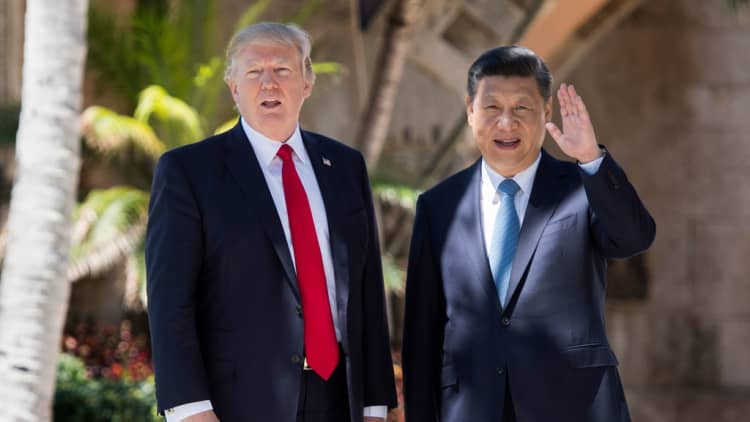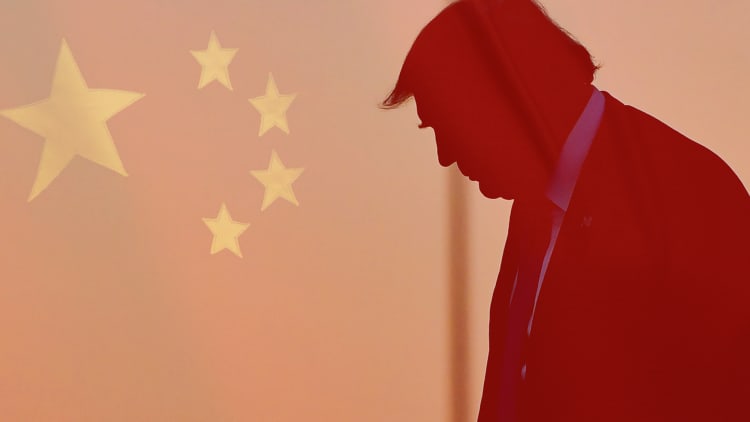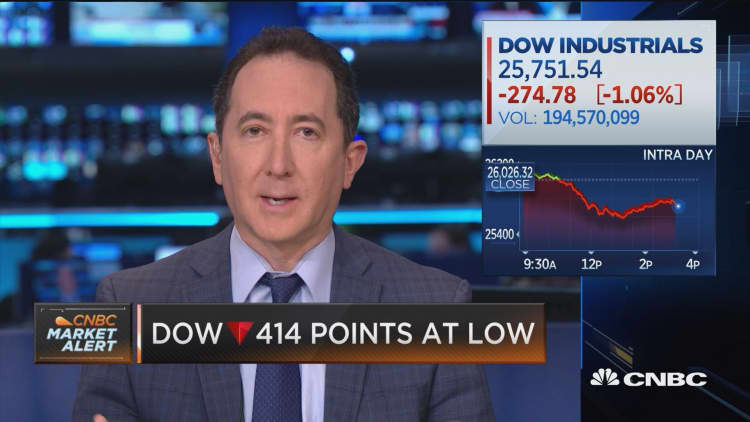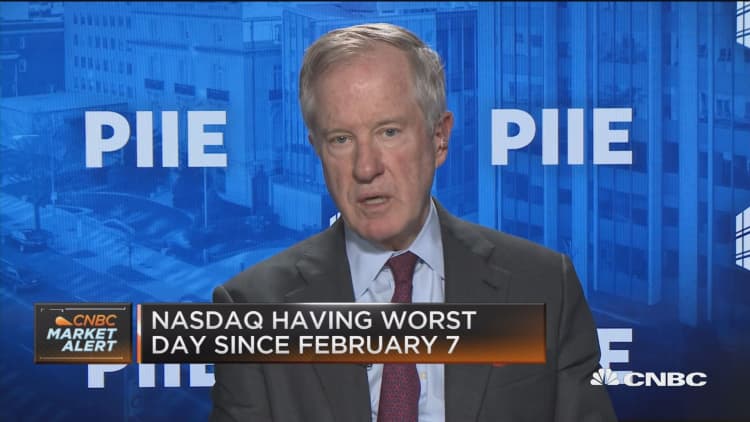The possible framework of a trade deal with China has been making its way into media reports, and based on what they are seeing, some investors are treating the potential agreement warily.
Stocks tumbled in a blistering sell-off Monday that sent the Dow down as much as 400 points at its worst levels before it recovered ground. Treasury yields, which move opposite price, were lower with the benchmark 10-year yield at 2.72 percent.
"It's sell the news," said Peter Boockvar, chief investment officer at Bleakley Advisory Group. "We're finally here. It's like we're at the finish line [on a trade deal]. The stock market has to reconcile with the bond market how the downward trend is going to reverse on a trade deal. Bonds are not smoking the same kind of optimism pipe that stocks are smoking."

Trump administration officials have sounded upbeat about the prospect for a trade deal, including National Economic Council Director Larry Kudlow, who said last week the trade negotiators have made "great headway."
Sources tell CNBC that a possible deal is close and that negotiations are in the "final stages" as the two sides plan a summit for the end of March at President Donald Trump's Florida resort, Mar-a-Lago. If a deal is struck, the U.S. could roll back tariffs on at least $200 billion in Chinese goods while China could remove or cut industry-specific tariffs like those on autos.
"I don't think the market is priced for a full blown deal, like all tariffs are opened up and the U.S. drops tariffs and China drops their tariffs. I think the market interprets this as both parties are at the table. They're talking. They're making progress. What is priced in is the U.S. is not raising tariffs to 25 percent or going further," said David Bianco, DWS chief investment officer Americas. "These are ongoing negotiations...In my mind, they're going to make a firm agreement not to raise tariffs in the near term. Maybe they remix the tariffs a little bit. Maybe a couple of goods come off, and a couple of goods go on."
Structural reforms
Strategists have said the biggest market pop would come from a deal that peeled away tariffs but also included serious structural reforms on intellectual property and technology transfers.
As per current discussions, China could possibly include language about state-owned enterprise subsidies and forced technology transfers, in to a new foreign investment law changing equity ownership rules. But sources tell CNBC, they are skeptical about how strong that language would be.
WATCH: Trade deal or no deal, the U.S. and China are still fighting for global power

According to news reports, Beijing would also increase purchases of U.S. goods, a move that responds to Trump's concern that it's the trade deficit between the U.S. and China that needs to be fixed. The purchases would include $18 billion in natural-gas from Cheniere Energy.
But some worry that any deal will not have enough teeth for enforcement and the rules on technology would ring hollow. It also seems likely that any deal would still be followed by rounds of negotiations on some of the knottier issues.
Dan Clifton, head of policy research at Strategas said removing the tariffs would be like lifting a $65 billion tax on companies, and it could also spur capital spending.
"Discussions are now moving to the next step—whether existing tariffs will actually be cut, which is not currently priced into equities. China is saying there will be no deal unless all tariffs are removed. It's difficult to see how the US would agree to removing existing tariffs unless a significant enforcement provision could be agreed upon," he wrote in a note. "The US enforcement proposal would allow the US to reimpose tariffs if China is found not to be in compliance with the possible agreement. That's a tough pill for China to swallow, but the drive to eliminate tariffs may get some version of it."

If tariffs are retained, some strategists say that would be a negative for the market since uncertainty would remain, and so would the impact on businesses.
"Removing the uncertainty of escalating tariffs should be enough to stimulate capex, but a cut to existing tariffs should provide a significant boost to US capex," Clifton notes.
"As such, a China deal is the most important 'stimulus' Trump could provide in 2019," he wrote.
U.S. Trade Representative Robert Lighthizer last week said the provisions to protect intellectual property are a big part of the working document. The plan is that bilateral meetings would take place on any disputes, and if the talks don't resolve them, the U.S. could impose tariffs.
"By the time you get through all these meetings and Chinese denials, you already did harm to America's businesses and workers. This is the U.S. going back to the Obama and Bush era," said Derek Scissors, resident scholar at American Enterprise Institute."We're in a situation where we're not enforcing our law now, and we're setting up a mechanism which is very similar to past mechanisms where we failed to enforce our laws."
Bianco said even if the deal does come up short in some investors' minds, it would be a positive. He said he expects the S&P to reach 2,950 by year end, and if there was a strong deal with China, removing all tariffs, it could move to 3,000.
But he expects a deal that could retain some tariffs.
"It's not just about trade. It's about trade being a policy tool to get China to the negotiating table, on the topics of trade and many other things," he said. Bianco said trade is an opening to other important issues, like the South China Sea.
"They've taken a lot of risks with the economy to make incremental gains, but this is going in the right direction. Overall it's a pretty good outcome," Bianco said.
Europe question
Boockvar said trade uncertainty could remain, and get even more negative for markets, if the Trump administration proceeds with tariffs on European cars, as threatened.
But he said the markets have already baked in an outcome for the China agreement. "The stock market is betting we'll get a quick reversal to the upside in economic growth on the trade deal. The bond market is saying it's not going to be enough," said Boockvar.
Traders had been expecting a deal and the market has been rising on the prospects of a deal for several weeks.
"Traders are getting cynical about the China deal in the sense that they think what [Trump] really wants is a North Korea deal and he needs China to get that done. instead of getting a terrific deal with China he might do things that helps [Chinese President] Xi [Jinping] feel better about things," said Art Cashin, UBS director of floor operations. Cashin said a North Korea deal could help trump get re-elected.
Scissors said by putting out a time frame on the deal, the Trump administration has given the upper hand to China. "The smart thing from the Chinese perspective is to take the small deal right away and keep talking about the other deal.
"You can take this piece by piece, and maybe get a reasonable outcome. If you say you want a deal by the end of March, your'e setting it up for the Chinese to game you and you could have made a similar deal long ago," he said.



